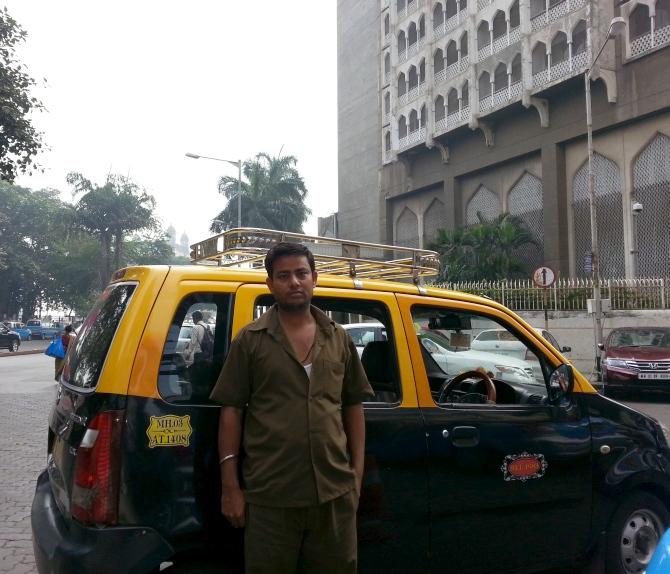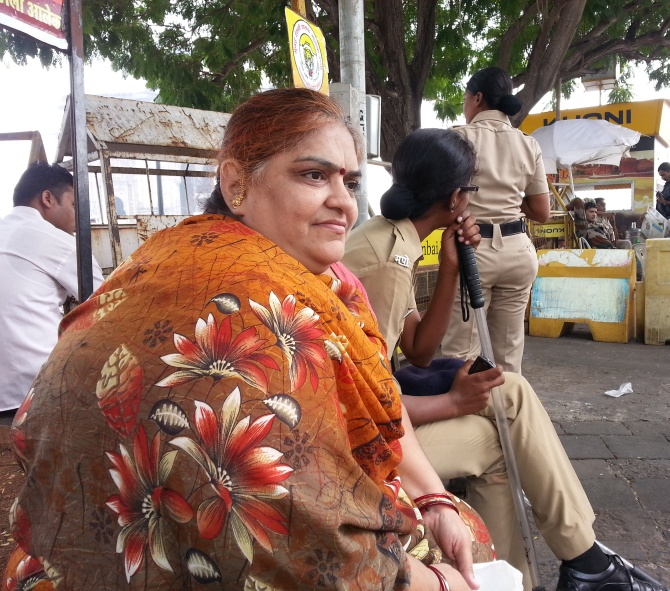
Has Mumbai moved on? Have Mumbaikars buried the memories of the ghastly terror attacks by 10 Pakistani terrorists that killed 166 of their fellow citizens and injured several hundreds? Prasanna D Zore visited two of the 26/11 sites to find out.
A taxi driver in Mumbai is without doubt considered the commonest of common men. Raju Singh, a cab driver in his mid-20s, looks sharp and ready for small talk and could be an exception to this thumb rule.
Five years ago, on the night of November 26, just like any other night, Raju and his fellow cabbies were waiting outside the Chhatrapati Shivaji Terminus for a long distance train to arrive. It was a routine he had been following for more than a year that night. Except that night, the train did not arrive and he had no passengers to ferry.
As he and his fellow cabbies were busy bantering away, they heard gunshots being fired. Star-struck, like any other Mumbaikar, Raju and his friends thought this had to be a scene from a film shooting and in a fit of blind adulation of all things Bollywoodian, rushed towards the CST station.
They saw a huge wave of fear-stricken people rush past them even as they sped in the opposite direction -- to catch a glimpse of some star. An abusive policeman charged at them with his lathi, his most potent weapon. He warned them of a terror attack underway at India's most iconic railway station.
"Agar who policewalla hum logon ko wahan se nahi bhagata toh aaj hamari ginti un murdo main hoti (Had that cop not warned us that night I too would have been a 26/11 casualty), Raju recalls as I alight from his cab close to the Taj Mahal Hotel.
When I had boarded Raju's cab from Churchgate station, he had no inkling of the historic significance of the day: The fifth anniversary of the most deadly terror attack on India's financial capital.
"O, aaj 26 tareekh hai? (Oh, is it 26/11 today?)," he said aloud when I asked him if any peace rallies were being held outside the Taj.
"Aaj toh kuch nahin ho raha hain wahan (There is nothing happening there today)," he said.
"Ab yahan log kyun aayenge? Kasab toh gaya(Why will people come here now that Kasab has been hanged)," he said, pointing to the fact that what motivated Mumbaikars until November 26, 2011 to come out in the streets and outside the Taj Mahal Hotel to demand justice for the victims of terror attacks was the fact that the lone Pakistani terrorist caught alive -- Ajmal Kasab -- was waiting for the gallows.
Kasab was secretly hanged at Pune's Yerawada Jail on November 21, 2012.
Kindly click NEXT for more...

Five days after Kasab's execution last year the crowd that had gathered outside the Taj and the CST, at martyr Tukaram Omble's memorial had shouted for stern action against Pakistan and Lashkar founder Mohammad Saeed in front of television cameras and journalists who asked them 'What next?' Mumbaikars then had anger against Pakistan, Pakistan-sponsored terrorists and Saeed.
This year, the scene outside the Taj was different. Forget anger in the streets. There was not a single person to commemorate the victims and martyrs of 26/11.
The day passed off as serene outside the Taj as it would have been on the morning of November 26, 2008. Scores of tourists, locals and foreigners, were enjoying the gentle breeze that wafted from the bay towards the Taj.
I spot Sarojben Waghela, a middle-aged lady, in conversation with two lady constables, just outside the barricades that separate the Gateway of India from the Taj. "Agar woh khana khane jaldi aata toh bach gaya hota (If he had come home earlier to eat, he would still be alive), she tells the young constables.
Sarojben is speaking about her brother-in-law Subhash Waghela, a pharmacist, who was shot by the terrorists who came out of the Leopold, another city landmark attacked on the night of November 26, 2008.
"They fired a number of bullets into him from close range. The bullets came out from his back," Sarojben recalls. Subhash's pharmacy, Chamunda Chemist, a joint-family enterprise, is three shops away from the Leopold.
Sarojben tells me the family, including Subhash's family, has moved on. "It has been five years."
She was not surprised at the absence of people who until last year had made the Taj on November 26, an annual pilgrimage. "Had Kasab been alive today, people would have been here. What's left now?"
"For all I know, until the next one happens, 26/11 is forgotten."